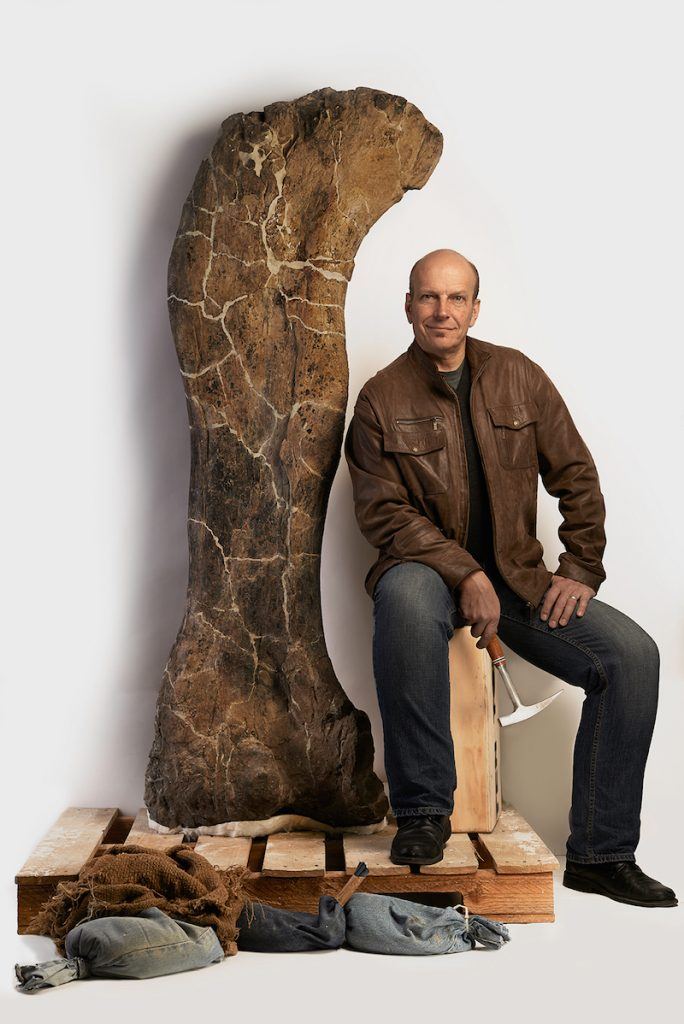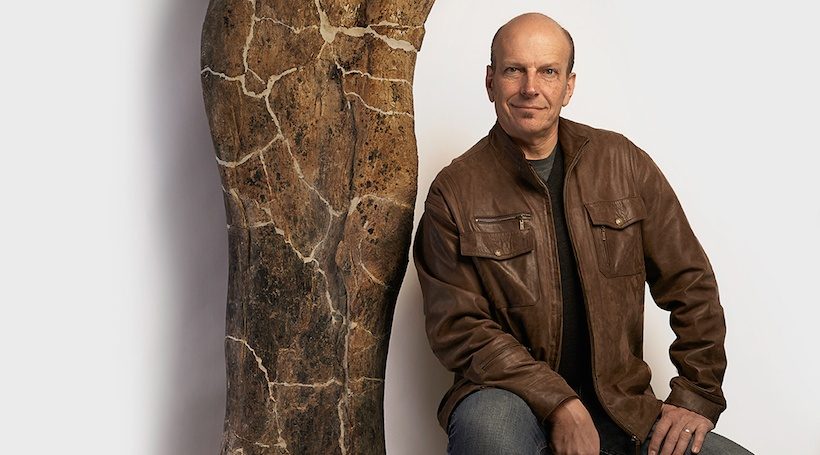Dinosaurs are awesome – and you don’t have to be a curious kid or educated professor to think so. Just ask Dr. Kenneth Lacovara – or read his book.
The paleontologist has already discovered a new dinosaur (the massive Dreadnoughtus) and captured the attention of TED Talk fans worldwide. Now, the Dean of Rowan University’s School of Earth & Environment is helping readers look to the future by digging into the past.

Photo by Robert Clark
Lacovara’s new book, “Why Dinosaurs Matter,” details the 165 million-year life span of dinosaurs, but uses words you’ll understand. He decided to write the text after his TED Talk, “Hunting for dinosaurs showed me our place in the universe,” earned nearly 1.5 million views and became one of the top 10 TED talks of 2016.
“This book is for the curious adult, who maybe wouldn’t normally buy a dinosaur book,” Lacovara says. “I could see that I hit on some topics that resonated with people. There is a lot of children’s literature about dinosaurs and literature written by paleontologists for paleontologists, but there aren’t a lot of dinosaur books written for a general adult audience.”
“Why Dinosaurs Matter” busts common myths about dinosaurs, and there are plenty. Lacovara once made a list of at least 50, including the idea that a T-rex’s short arms weren’t powerful.
“One hundred percent of the information we will ever have to plot our course in the future is in the past,” Lacovara says. “It’s the past that really matters, and I use dinosaurs in place of the past. There are lessons about what we can anticipate in the future and, hopefully, how we can mitigate what we have on our horizons.”
Check out this excerpt from his new book:
…Why is the word dinosaur used so often as a pejorative to describe obsolescence? How did dinosaur become an epithet to invoke an inability to adapt to changing conditions? Why are dinosaurs the one group of animals associated most closely with failure?
These slanders against the good name of the dinosaurs are no mere colloquialisms. They are proper English. They have been codified, legitimized, and set to type by the lexicographers of all the major English dictionaries. Crack open the Merriam-Webster dictionary, and you will find that the word dinosaur means “one that is impractically large, out-of-date, or obsolete.” Consult the Cambridge Dictionary and learn that a dinosaur is “something that is old and that has not been able to change when conditions have changed and is therefore no longer useful.” Heft open the queen mother of all English lexicons, the Oxford English Dictionary, and you will find definitive proof that dinosaur can be quite properly used to refer to “someone or something that has not adapted to changing circumstances.”
With such weighty authority against them, it’s no wonder that the legacy of the dinosaurs is so often dragged through the metaphorical mud. I could fill a book with defamatory comparisons to dinosaurs. Here’s a brief sampling: IBM is an “IT Giant Commonly Viewed as a Dinosaur,” the headline read. “Intel: A Dinosaur Headed for Extinction?” pondered an investment site. “Both Major Parties Are Seen as Dinosaurs – Old Institutions That Do Not Fit the Times or Challenges of the Day,” opined the Wall Street Journal. To all that, I say humbug! They should all hope to be so lucky.
What CEO wouldn’t daydream lustily about global dominance spanning a geological era? What board chair wouldn’t crave the rapid growth of thousands of successful franchises the way that dinosaur species exploded across the globe, as they conquered continent after continent? What head of R&D wouldn’t revel in the development of unprecedented feats of speed and size and power and versatility? Dinosaurs pushed the envelope of physiological possibility, broke record after record, and were paragons of success by almost any measure.
Considering, as a whole, the breathtaking adaptations of dinosaurs, such as titanic size, devastating power, extravagant plumage, razor-sharp teeth, and bizarre spines, plates, horns, and clubs, the public adoration for these amazing creatures is not surprising. What is surprising is our dichotomous relationship with the concept of dinosaurs. How did these versatile creatures, arguably the most successful group of large land animals in Earth history, get labeled as the epitome of prehistoric failure?
The most damning misconception about dinosaurs is the idea that their extinction, except for the birds (more on that later), represents their own failure to adapt to changing conditions. Until relatively recently, the idea seemed patently true. If only they weren’t such dim-witted, sluggish, stuck-in-the-mud, ponderous creatures, maybe they could have survived and hung on to the domain that was once theirs. But they weren’t good enough. Not clever enough. Not adaptable; like our own tiny ancestors. And in the end, they couldn’t hack it, and the cream, like it always does, rose to the top. The mammals took over, and here we are, smarty-pants primates, with dominion over the Earth. That was the narrative.














